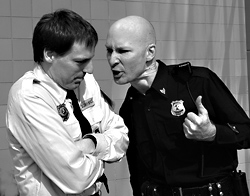In the work of writer-director Kenneth Lonergan, the drama is in the details. A rookie New York cop, just three months on the job and as green as a lime lollipop, goes to work in little-girl pigtails that dangle down out of her navy blue cap like a pair of broken antennae. Her partner, a hard-boiled veteran with whom she is naively, desperately smitten, decides one night to read her the riot act, chewing her out for her lack of understanding about the way things really work in the police force. It’s a brutal and manipulative dressing-down—a cop’s life is shitty enough without some persnickety chick giving him hell about bending the rules—and, in the process, he takes a snide, sexually demeaning swipe at her hairstyle. Nothing else is said about the matter, but in the very next scene, she shows up for work in a tight ponytail. And that small, Chekhovian gesture—so like life—contains an ocean of excruciating truth about why we do the things we do.
Lonergan—whose auteur debut, You Can Count on Me, was one of the best independent films of the past decade—is a master at capturing the nitty-gritty, dirty-fingernail reality of everyday life. His characters, stuttering, stumbling, struggling to be understood, are never types. So there’s a certain irony in the very title of Lobby Hero, which opened last week at Seattle Public Theater. There are no heroes in Lonergan’s world. They may slouch here and there toward improvement, but forget about redemption—the fight for equilibrium is battle enough. On the surface, the key conflict in Lobby Hero does center on a clear moral dilemma, yet each of the play’s four characters confronts that dilemma with such a hefty weight of emotional baggage that the drama’s ethical underpinnings become nearly moot. Lonergan’s art is diagnostic. What he portrays, in all their querulous backtracking and second-guessing, are modern-day sad sacks at once too wise and too scared to make a clear choice—to take a stand in a world chock-full of answers but seriously lacking in, well, heroes.
Evan Whitfield plays Jeff, a chronic slacker and inveterate wiseacre stuck pulling night detail for a security firm that guards apartment lobbies. Though he dreams of a career in advertising, we sense that Jeff isn’t going anywhere. The apex of his creativity is devising a way to catch a nap behind a newspaper. Making the rounds one night, Jeff’s boss, William (Connell Brown Jr.), haltingly confides that he, William, may provide a false alibi to save his brother from being convicted for a crime he may or may not have committed. Further complicating the matter are the two cops—the rookie Dawn (Sharia Pierce) and her partner, Bill (Roy Stanton)—who appear in the lobby every night just so Bill can “visit” an actress upstairs. These four confused, compromised individuals—via motives that are sexually, ethically, and psychologically tortured—become inextricably bound to one another, their separate fates placed very accidentally in each other’s hands.
Director Rita Giomi superbly juggles the complexities of Lonergan’s script by focusing on the characters’ relationships, allowing their nuances and subtleties to come to the fore and drive the drama. The actors all turn in nice performances, especially Pierce and Whitfield, who develop an awkwardly sweet repartee. In a sense, Lobby Hero, with its insistence on the intimate tics and quirks of communication, presents a kind of anti-theater: Everything is just what it is. Yet thanks to Lonergan’s fidelity to the unsentimental observation of everyday reality—not to mention his significant talent—the play conjures a world as vast and rich with meaning as anything theater has to offer. All this, and the play never moves beyond the apartment lobby. Now that’s heroic.








